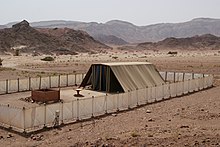古以色列人
閱讀設定
古以色列人(/ˈɪzrəlaɪts, -riə-/,[1][2] 希伯來文:בְּנֵי יִשְׂרָאֵל,羅馬拼音:Bənēy Yīsrāʾēl,意思係 「以色列之民」)係一班閃語族群嘅部落,喺鐵器時代期間住喺迦南地[3][4][5][6]。

“以色列”呢個名,最先喺法老麥倫普塔喺主前1200年代所寫嘅版塊出現。現代嘅考古學發現,古以色列人係由迦南人分支出嚟,之後發展咗圍繞住耶和華嘅一神論宗教[7][8][9][10][11]。佢哋講迦南話嘅一種方言,之後演變成爲聖經希伯來文[12]。喺鐵器時代期間,以色列聯合王國出現咗。喺王國分裂之後,北國以色列喺主前720年代俾亞述毀滅[13],而南國猶大就喺主前586年俾巴比倫消滅[14]。古以色列人有部分俾人驅逐咗去巴比倫,但係喺居魯士大帝掌權之後,佢哋返咗去以色列[15][16]。
根據《聖經》記載,以色列人係雅各嘅後代,之後改咗名叫“以色列”。喺經過迦南地嘅一次旱災之後,雅各同佢嘅12個仔逃咗去古埃及,成爲以色列十二支派。以色列人喺埃及耐咗之後成爲咗奴隸,並喺摩西嘅帶領之下,成功逃離埃及,喺約書亞之下,成功佔據迦南。
大部分嘅學家都認爲妥拉嘅記載並唔完全合乎現實,反而係一種國家神話,但係内容嘅中心應該有真實嘅歷史背景[17]。聖經所提及嘅聯合王國亦同樣受唔同嘅學家質疑[18][19]。
猶太人同撒瑪利亞人都係以古以色列人為祖先[20][21][22][23]。猶太人嚟自猶大支派、便雅憫支派、同部分嘅利未支派。撒瑪利亞人嚟自約瑟支派入面嘅以法蓮支派同瑪拿西支派、同埋留咗喺迦南地嘅利未支派。有其他族群都有聲稱嚟自古以色列人。
睇埋
[編輯]攷
[編輯]- ↑ "Israelite". Lexico UK English Dictionary. 牛津大學出版社. 原著喺23 November 2021歸檔.
- ↑ "Israelite". Merriam-Webster Dictionary.
- ↑ Finkelstein, Israel. "Ethnicity and origin of the Iron I settlers in the Highlands of Canaan: Can the real Israel stand up?." The Biblical archaeologist 59.4 (1996): 198–212.
- ↑ Finkelstein, Israel. The archaeology of the Israelite settlement. Jerusalem: Israel Exploration Society, 1988.
- ↑ Finkelstein, Israel, and Nadav Na'aman, eds. From nomadism to monarchy: archaeological and historical aspects of early Israel. Yad Izhak Ben-Zvi, 1994.
- ↑ Finkelstein, Israel. "The archaeology of the United Monarchy: an alternative view." Levant 28.1 (1996): 177–87.
- ↑ Smith, Mark (2002). The Early History of God: Yahweh and Other Deities of Ancient Israel. Eerdman's. p. 6-7.
- ↑ Rendsberg, Gary (2008). "Israel without the Bible". In Frederick E. Greenspahn. The Hebrew Bible: New Insights and Scholarship. NYU Press, pp. 3–5
- ↑ Gnuse, Robert Karl (1997). No Other Gods: Emergent Monotheism in Israel. England: Sheffield Academic Press Ltd. pp. 28, 31. ISBN 1-85075-657-0.
- ↑ Haran, Menahem (1996). מקדש, מקרא ומנורה (英文). Eisenbrauns. ISBN 978-1-57506-003-3.
It is also clear that there were polytheistic Yahwists in ancient Israel who worshiped YHWH along with other deities
- ↑ Collins, Steven; Holden, Joseph M. (2020-02-18). The Harvest Handbook of Bible Lands: A Panoramic Survey of the History, Geography, and Culture of the Scriptures (英文). Harvest House Publishers. ISBN 978-0-7369-7542-1.
At its inception, early Yahwism had animistic and polytheistic elements
- ↑ Steiner, Richard C. (1997), "Ancient Hebrew", in Hetzron, Robert (ed.), The Semitic Languages, Routledge, pp. 145–173, ISBN 978-0-415-05767-7
- ↑ Broshi, Maguen (2001). Bread, Wine, Walls and Scrolls. Bloomsbury Publishing. p. 174. ISBN 978-1-84127-201-6. 原先內容歸檔喺10 February 2023. 喺8 February 2022搵到.
- ↑ Faust, Avraham (2012-08-29). Judah in the Neo-Babylonian Period. Society of Biblical Literature. p. 1. doi:10.2307/j.ctt5vjz28. ISBN 978-1-58983-641-9.
- ↑ Jonathan Stökl, Caroline Waerzegger (2015). Exile and Return: The Babylonian Context. Walter de Gruyter GmbH & Co. pp. 7–11, 30, 226.
- ↑ Encyclopaedia Judaica.第3卷 (第2版). p. 27.
- ↑ Dever, William (2001). What Did the Biblical Writers Know, and When Did They Know It?. Eerdmans. pp. 98–99. ISBN 3-927120-37-5.
- ↑ Thomas, Zachary (2016-04-22). "Debating the United Monarchy: Let's See How Far We've Come". Biblical Theology Bulletin. 46 (2): 59–69. doi:10.1177/0146107916639208. ISSN 0146-1079. S2CID 147053561.
- ↑ Lipschits, Oded (2014). "The history of Israel in the biblical period". 出自 Berlin, Adele; Brettler, Marc Zvi (編). The Jewish Study Bible (英文) (第2版). Oxford University Press. pp. 2107–2119. ISBN 978-0-19-997846-5. 原先內容歸檔喺9 April 2023. 喺16 May 2022搵到.
- ↑ Adams, Hannah (1840). The history of the Jews : from the destruction of Jerusalem to the present time. Sold at the London Society House and by Duncan and Malcom, and Wertheim. OCLC 894671497.
- ↑ Brenner, Michael (2010). A short history of the Jews. Princeton, N.J.: Princeton University Press. ISBN 978-0-691-14351-4. OCLC 463855870.
- ↑ Ostrer, Harry (2012). Legacy : a Genetic History of the Jewish People. Oxford University Press USA. ISBN 978-1-280-87519-9. OCLC 798209542.
- ↑ Kartveit, Magnar (2014-01-01). "Review of Knoppers, Gary N., Jews and Samaritans: The Origins and History of Their Early Relations (Oxford: Oxford University Press 2013)". Journal of Hebrew Scriptures. 14. doi:10.5508/jhs.2014.v14.r25. ISSN 1203-1542.
